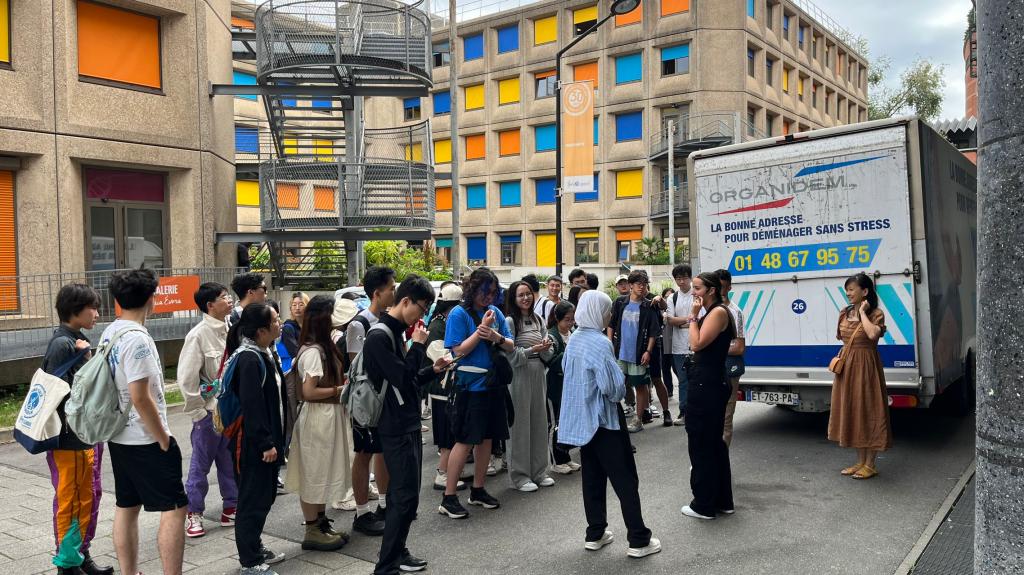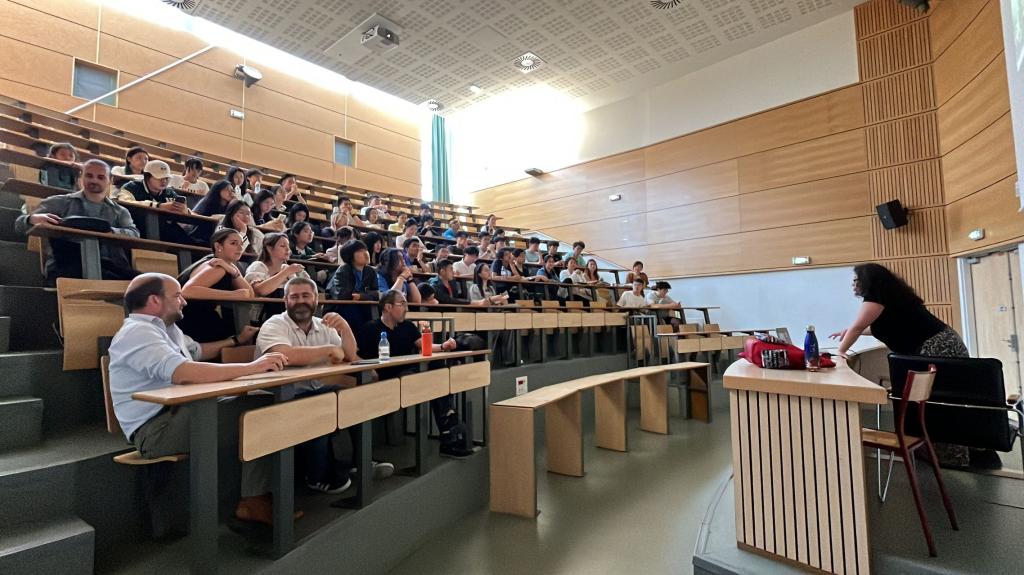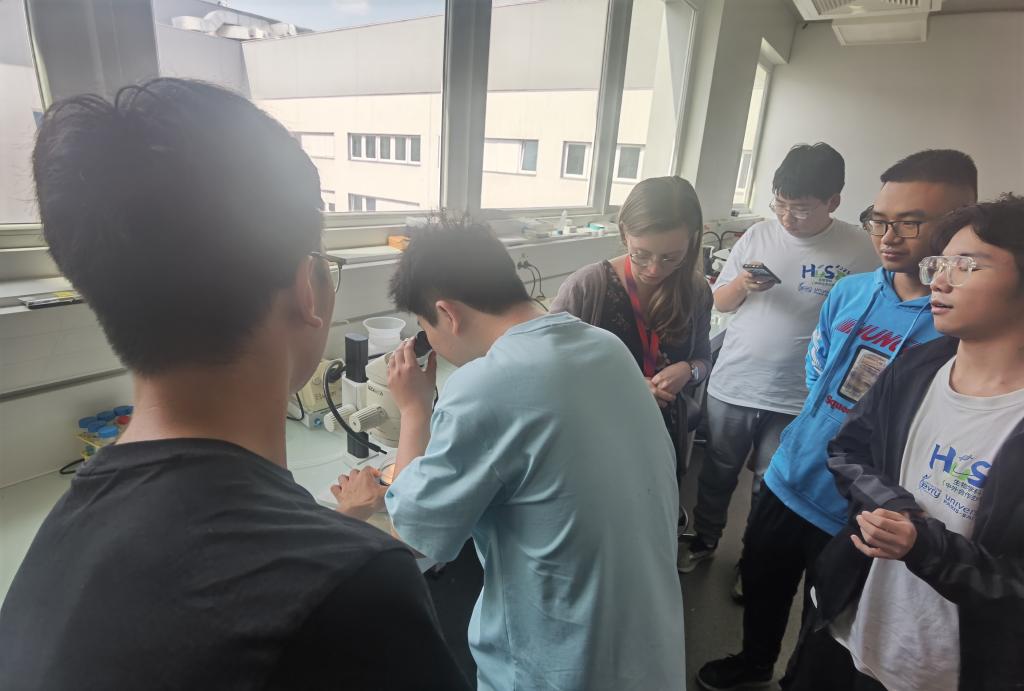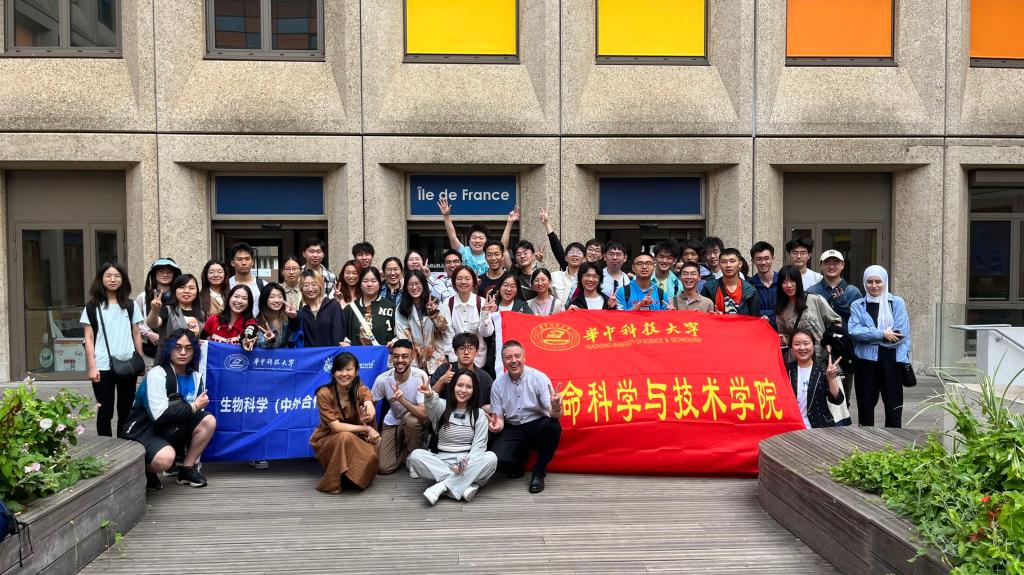中法生物科学中外合作办学班2021级
2023年巴黎萨克雷大学研学夏令营日志-07.03
记录小组: “吴彦组”
组长:刘含宇
组员:杨云天/帅扬/刘晋滔/章茜媛/陈宇/刘怡佳
今天我们正式开始了在法国的学习生活。早餐后,教授向我们讲解了本次活动总体和今日的安排,然后由法方学生带我们参观Evry大学的教学楼。

简单的午餐后,我们乘车来到了凡尔赛大学。多位凡尔赛大学的教授分别为我们讲解了他们的研究,主题分别是“败血症和治疗”,“脊髓后的生理病理学和伤后治疗学”,“果蝇模型:一个强大的遗传工具”。各位教授各自的研究方向虽然并不相同,对它们的讲解也在不同方向各有侧重,但都丰富多彩,热情洋溢,使我对这个科学有了更深入的认识,让我对生物学的广度和深度有了全新的理解。他们也都强调,尽管各个研究方向各有其特色,但它们相互交织,相互影响,共同推动着生物科学的发展。

之后,教授们为我们讲解了接下来要前往参观的实验室的不同材料和设备,分别是光谱分析平台,流式细胞仪平台,以及果蝇房。教授们的介绍深入浅出,生动有趣,让我们对于不同实验室及实验设备的功能有了初步了解。随后,我们便直接前往凡尔赛大学的生物实验室进行实地参观。我们分三组轮流参观了果蝇实验室、流式细胞仪与显微观察室、质谱分析室。我们首先参观了果蝇实验室,法方的学姐向我们讲解了果蝇实验的实验原理和基本操作。教授解释说,尽管这些微小的生物看似与人类无关,但它们的遗传特性使它们成为了基因研究的理想模型。之后,是流式细胞仪和显微镜观察室,我们了解到了不同显微镜的功能和应用场景,并惊讶于流式细胞仪高昂的价格。最后,则是质谱分析室,这是一种可以用来确定化学样品分子质量、结构的仪器。在教授的讲解中,了解到质谱仪分析可以帮助科研人员确定蛋白质、核酸等生物大分子的分子质量和结构,对于生物科学的研究至关重要。我们了解到了质谱仪的分析原理与操作方法,并且学习了目标分析和非目标分析质谱仪在样本检测和分析中的区别和各自的作用。理论讲座和实地参观相互配合,帮助我们更好地学习了解到了常用的生物学材料与设备的使用方法和操作原理。

在下午的学习中,我们深切感受到了生物科学的魅力。这不仅仅是一门学科,更是一个探索生命奥秘的旅程。凡尔赛大学的学者们对于生物科学的热爱和追求,让我们对这个领域充满了敬意和好奇,我们更加期待未来18天的学习生活。

Today is 3th July, 2023, Monday. We have officially begun our academic life in France. After breakfast, the professor explained to us the overall plan and today's schedule. Then, French students took us to tour the academic building of the University of Evry.
After a simple lunch, we arrived at the University of Versailles by car. Several professors from the University of Versailles introduced us to their research topics, which included "Sepsis and its Treatment," "Physiopathology and Post-injury Treatment of the Spinal Cord," and "Drosophila Model: A Powerful Genetic Tool." Even though the professors' research directions varied, their respective explanations each emphasized different aspects. Their presentations were vibrant and rich in detail, giving me a deeper understanding of the science and a fresh perspective on the breadth and depth of biology. They all highlighted that, despite the unique characteristics of each research direction, they all interweave and influence one another, jointly driving the development of biological science.
Subsequently, the professors introduced us to the different materials and equipment of the laboratories we were about to visit: the spectroscopic analysis platform, the flow cytometry platform, and the fruit fly room. The professors' introductions were thorough and interesting, giving us a preliminary understanding of the different laboratories and experimental equipment. We then proceeded to visit the biological laboratories at the University of Versailles. We split into three groups and took turns visiting the fruit fly lab, the flow cytometry and microscopy observation room, and the mass spectrometry room. We first visited the fruit fly lab, where a French senior student explained the experimental principles and basic operations of fruit fly research. The professor explained that despite these tiny organisms seeming irrelevant to humans, their genetic characteristics make them ideal models for gene research. Next, we visited the flow cytometry and microscopy observation room. We learned about the functions and application scenarios of different microscopes, and were amazed by the high cost of flow cytometers. Lastly, we visited the mass spectrometry room, an apparatus used to determine the molecular mass and structure of chemical samples. From the professor's explanation, we understood that mass spectrometry can help researchers determine the molecular mass and structure of large biological molecules like proteins and nucleic acids, which is crucial for research in biological science. We learned about the operating principles of mass spectrometry and the differences and respective roles of target analysis and non-target analysis mass spectrometers in sample detection and analysis. The combination of theoretical lectures and field visits helped us better understand the common methods and operating principles of biological materials and equipment.
In the afternoon's learning, we deeply felt the charm of biological science. This is not just a discipline, but a journey to explore the mysteries of life. The passion and pursuit of the scholars at the University of Versailles for biological science filled us with respect and curiosity for this field, and made us look forward to the next 18 days of academic life.